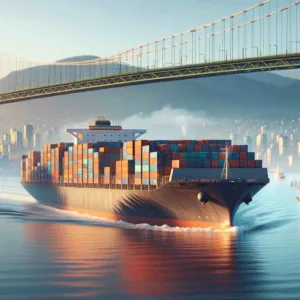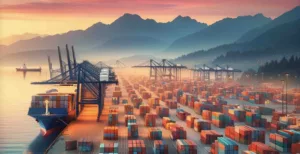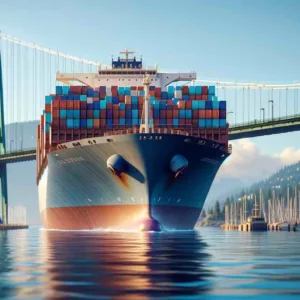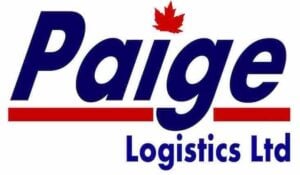The global demand for goods and services has increased while simultaneously becoming more complex as a result of globalization.
More cost-effective, and environmentally responsible logistics service flows are driving a big boom for worldwide shipping.
Describing the process of transferring goods from one vehicle to another without direct handling, this transportation method involves consolidating cargo into sealed cargo transport units (CTUs), such as containers, mobile cartons, or semi-trailers.
By minimizing handling, this approach reduces the likelihood of items being lost, damaged, or stolen during the intermodal freight shipping process. Additionally, these units facilitate transferring products between different modes of transport (e.g., road, rail, sea) to reach their final destination.
Intermodal transportation refers to combining and coordinating various modes of transport, optimizing the logistics of product delivery.
What are the benefits of intermodal transportation?
- Speeding up and improving the transfer of goods and materials.
- Cost savings, including both full-load and groupage shipping for exporters who don’t need an entire container, by utilizing intermodal transport.
- Streamlining operations by reducing handling, labor, transition time, and loading/unloading time through loading units efficiently.
- Minimizing risk and keeping track of cargo easily during transfers since items remain together.
- Preventing theft, damage, and loss by keeping cargo compartments sealed until delivery.
- Simplifying customs inspections and controls by sealing CTUs, which speeds up delivery by reducing travel and waiting time, as well as accelerating examinations. Generally, tightly controlled and secured cargo undergoes fewer inspections.
Eco-benefits and features:
- Reducing transportation emissions and enhancing sustainability due to savings on packaging, per-unit energy consumption, and vehicle CO2 emissions.
Integrated intermodal transport chain optimizes the effectiveness of all modes of transport.
- Road transport’s door-to-door capability.
- Punctuality, long-distance speed, and rail transit viability are vital.
Moving large amounts of cargo at low marine transport prices.
What distinguishes intermodal and multimodal transport?
Intermodal transportation entails the movement of products via multiple modes of transportation, each with a separate transport company and contract.
Multi-carrier voyage. Each component will be delivered by a distinct shipping company.For each shipment leg, the shipper will negotiate with each conveyance operator.
Multimodal transportation is the movement of goods using multiple modes of conveyance under a single contract or bill of lading.
All shipments are transported by the same individual. Multimodal transportation combines multiple modes of conveyance onto a single bill of lading.
Both “intermodal transport” and “multimodal transport” are frequently confused with one another and used interchangeably as a result. The two are not quite interchangeable.
The primary distinction between these two modes of transportation is that multimodal transport conveys many kinds of cargo, such as pallets and containers, while only providing a single document (the FIATA Bill of Landing, FBL), which covers the entire operation.
However, intermodal transport makes use of CTUs, which are mostly containers but can also be temperature controlled containers, semi-trailers or mobile boxes. These CTUs are able to transition from one method of transport to another without having to be opened up.
Additionally, a transport record is generated for every mode of transportation (truck, boat, etc.) that is a part of the logistics services process.
However, the documentation for each of them is consistent with one another.
It is not always the case that one is superior to the other; rather, it depends on the needs of each company and the qualities of the products they sell.
A logistics operator can assist in determining the optimal solution for each unique circumstance.
Despite this, it’s gaining popularity in the sphere of international transportation due to its numerous benefits, most notably its ability to maintain the integrity of the cargo.
There are a number of elements that have come together in such a way that they are causing international transit to more and more closely resemble multimodal transport.
More relevant infrastructures:
- The modernization of transportation infrastructure is resulting in greater connections between ports and railway routes, which results in a combination of transportation that is more flexible.
- In addition, there has been some development in the area of harmonizing and standardizing the administrative and legal processes that are involved in the transportation of products.
Planning for vehicular traffic:
This kind of transportation is experiencing difficulties as a result of rising demand that is not being met by the available professionals due to a lack of drivers and capacity concerns.
The ever-increasing cost of fuel is putting a damper on the attractiveness of this mode of transportation, at least for very lengthy trips.
Efficiency gains as a result of procedures in logistics that are more up to date and are based on information and technology are able to facilitate cheaper rates, improved time estimates, and reduced handling costs.
Because of this, the linked means of transportation produce a bigger overall value addition. Innovative methods for conducting business:
The pursuit of better competitiveness, in addition to the development of values such as increased sustainability or a decrease in the number of accidents that occur.
When to go for a service that provides multimodal transportation
Since port connections and other international transport hubs are advancing, intermodal transport is becoming an increasingly important mode of transport.
Intermodal transport is the optimal approach to shipping commodities across international borders.
Therefore, it will be advantageous for many businesses to utilize an intermodal transport service whenever possible.
In order to understand freight forwarder‘s methods which entails, drayage and possible dry van freight, warehousing, trucking services match to trailer type to convey a load from door to door, they require a complicated operation.
They want to move the goods over great distances, but they also want to minimize the danger of any problems occurring along the way, such as loss, leaking, getting held up at customs, and so on.
Looking for ways to reduce the costs associated with international transportation? Container shipping China to Canada or Shipping Canada to USA they want items delivered within a specified timeframe utilizing international transit while simultaneously reducing any logistical issues that may arise.
The organization’s core values place a strong emphasis on environmental responsibility. Utilizing the services of a logistics company is always the best option.
However, the best part is that the dedicated transport services managed by a logistics company is that they will take care of the entire operation, acquiring the most efficient combination of transport modes in accordance with your budget and the deadlines.
At Paige Logistics, we are seasoned freight forwarding professionals. No matter what kind of logistics services you have in mind.
You do not have to worry about a thing and your cargo connects safely at your destination right at the time you wish it to arrive.
2023 Global Leader In Shipping

Author & Chief Executive Officer at Paige Logistics Ltd. → Experienced Operations Manager with a demonstrated history of working in the Transportation, Shipping, Trucking and the Railroad Industry.
Related Posts

Freight Brokerage Unlocking the Potential of Freight Brokerage Solutions for Your Business Click For Best

Freight & Shipping Insurance The Comprehensive Guide to Shipping Insurance for Freight in International Trade

Understanding Specialized Transport Click For Best Price From Giant Machines to Hazardous Materials: The Wild

Seasonal Load Restrictions How to Outsmart Seasonal Load Limits and Save Big! Click For Best

Mastering the Intricacies of CFR Incoterms A Comprehensive Guide Click for Best price CLICK ON

CIF Incoterms The Comprehensive Guide to CIF (Cost, Insurance & Freight) in International Trade Click
Looking For New Partners?
At Paige Logistics we have proven experience in logistics as integral transport providers. We work hard to ensure that your freight safely travels to the destination fully guaranteed and at the best freight rate.
Put your cargo in our hands and we’ll deliver it by rail, truck, sea in the shortest possible time.

